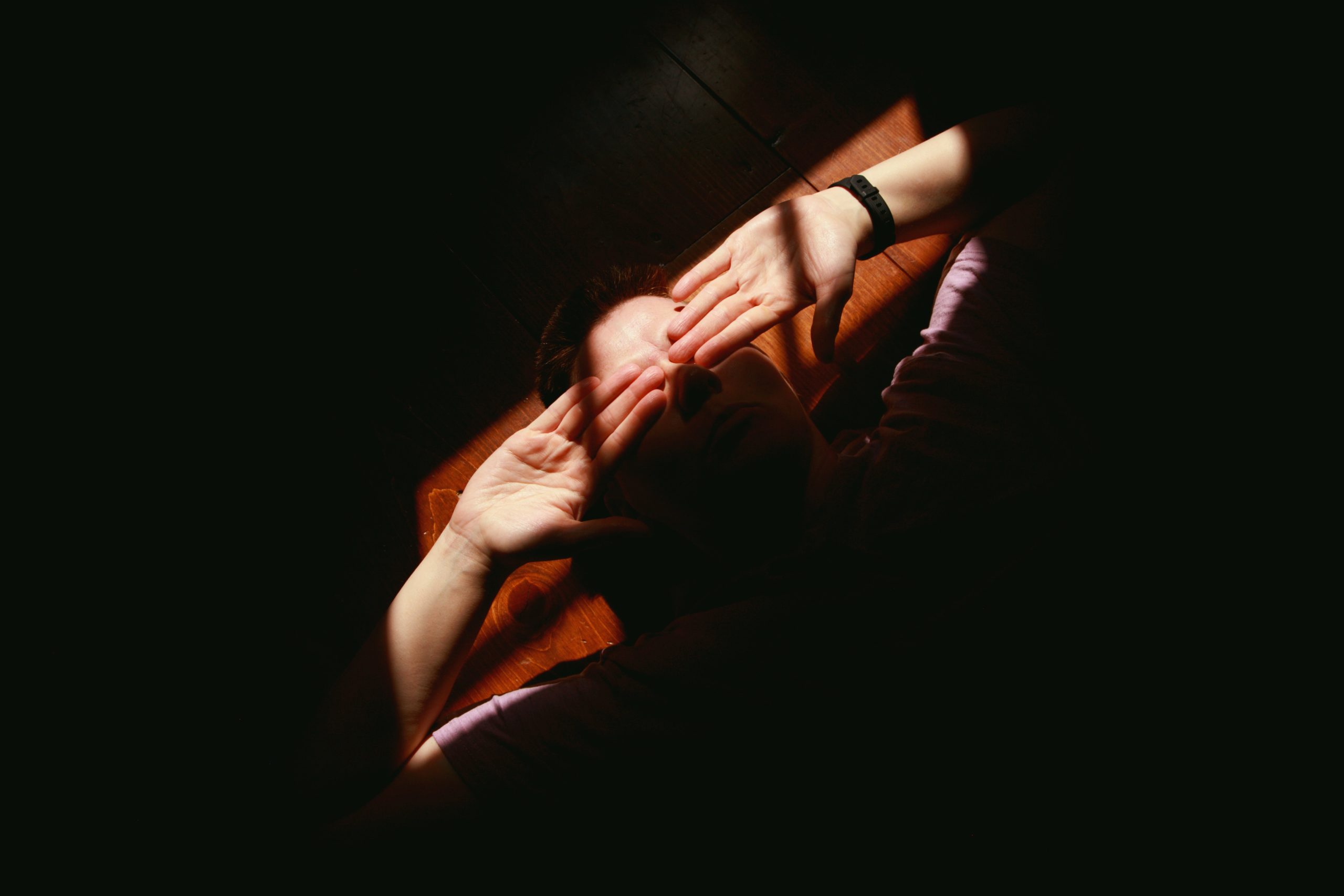When you forget to put on your sunglasses before stepping outside during the middle of the day, you probably immediately notice your eyes are sensitive to sunlight. You’ll squint, shield your eyes with your hand, and blink repeatedly until you put your sunglasses on. This is normal for anyone, and there’s a good reason why nature made all of our eyes sensitive to sunlight — to remind us to protect them from the damage sunlight can cause.
But if you have photophobia, it’s more than eyes being sensitive to sunlight. There’s a lot more to it than that.
Photophobia is a chronic medical condition where sunlight or other types of light actually cause pain, headaches or migraines, eye dryness, burning sensation, excessive tearing, and nausea. There are many reasons why sunlight sensitivity occurs, such as meningitis, lupus, acute photophobia, eye surgery, eye infection, eye abrasion, and much more.

If you’re anything like Vivian, normal activities like driving during the daytime could be extremely difficult due to sunlight sensitivity.
“It was impossible for me to drive during bright sunlight (even with sunglasses) or at night.”
Imagine having that “just walked out of a movie theater at noon” feeling — only it’s all the time. In this article, we’ll talk about why your eyes might be sensitive to the sunshine and what you can do about it.
Possible Reasons Why Your Eyes Are Sensitive to Sunlight
One of the reasons why your eyes are sensitive to the sun is because of photophobia, but it’s not the only one. Let’s go a little more in depth about photophobia, and then discuss what else might be causing your sunlight sensitivity.
Eye pain or light sensitivity causes:
- Chronic photophobia
- Lupus
- Meningitis
- Anxiety or depression
- Acute photophobia
- Injury to head or face
- Eye surgery
- Eye infection or abrasion
- Dark adaption
- Photokeratitis
Chronic Photophobia
As we’ve already mentioned, your extreme sensitivity to sunlight might be due to a condition called photophobia. For many, photophobia is a chronic condition that becomes part of everyday life, and the severity of your case likely varies from others.
You may take steps to reduce your exposure to harsher types of artificial light such as fluorescent lights or digital screens by wearing blue blocking glasses or light sensitivity glasses. Glasses for light sensitivity like Axon Optics with Avulux® lenses may be your best bet for that, as they have been shown to absorb up to 97% of harmful light (blue, amber, and red) from whatever source it may come.
But artificial lighting aside, sunlight is likely one of your primary culprits. And if you also happen to suffer from migraine, your sensitivity to sunlight could trigger a migraine within minutes.
Chronic photophobia could be caused by several underlying issues.
Medical Conditions
Ongoing or chronic photophobia or sunlight sensitivity may also be related to certain medical conditions, such as lupus. If you have lupus, your sensitivity to the sun could also manifest itself via visual floaters, dry eye, retinal complications, lesions, or changes to the muscles surrounding the eye.
Another medical condition that may be related to your sunlight sensitivity is meningitis. Meningitis is known to cause swelling in the brain, along with headaches. Bright light like sunshine can make those headaches even worse.
Anxiety or Depression
If you deal with anxiety, depression, or panic disorders, sunlight sensitivity could be a related issue for you. People with these psychiatric challenges may be more sensitive to bright light than others.
Acute Photophobia

If your eyes are sunlight sensitive due to a recent injury or surgery, your sensitivity could fade as you recover. In some cases, photophobia may arise after an injury, surgery or other trauma, but stay with you long-term and become a chronic condition that leaves you painfully sensitive to sunlight. Conditions that may cause acute photophobia include:
Injury to the Head or Face
A concussion usually occurs as the result of an injury to the head or face. One of the possible symptoms of concussion or post-concussion syndrome is light sensitivity, including eye sensitivity to the sun.
By definition, a concussion is a type of mild traumatic brain injury or TBI. TBIs of any type may cause short or longer-term sensitivity to both artificial and natural light, along with other symptoms.
Eye Surgery
Some people experience short-term sensitivity to sunlight or other types of light after having eye surgery such as LASIK or cataract surgery. For a few people, light sensitivity after eye surgery may become chronic.
Eye Infection or Abrasion
Eye conditions like uveitis, iritis or keratitis can be painful enough on their own, but also bring on extreme sensitivity to light. Corneal abrasions or scratches are also painful, and may result in acute sensitivity to the sunshine or artificial light.
Inadequate Eye Protection

The good news is that being sensitive to the sunlight doesn’t necessarily mean you have photophobia. It could be that you just aren’t giving your eyes sufficient protection, which is an easy fix. But if you persist in leaving your eyes vulnerable to the bright sunshine, it could lead to damage.
In fact, did you know your eyes can actually get sunburned? When this happens, it’s called photokeratitis. It’s usually related to excessive UV light exposure, and may result in pain, redness, blurred vision, headache, twitching, seeing halos, and more.
Dark Adaptation
If you’ve been wearing sunglasses indoors due to extreme light sensitivity, or tend to retreat into the darkness with frequent migraines, you may have become more sensitive to sunlight over time. This is called dark adapting your eyes, and it’s the reason why light sensitive people should wear precision-tinted glasses for photophobia rather than sunglasses.
Light sensitivity glasses only block the types of light most likely to create symptoms (such as migraine) for people with photophobia, rather than blocking all wavelengths the way sunglasses do. This offers protection without dark adaptation.
Lighter Colored Eyes
If you have light-colored eyes, some believe you could be more likely to be sensitive to sunlight. The idea is that lighter colored eyes are less able to block the effects of the sunshine, simply because there is less pigmentation (think of your iris like sunglasses). Having less macular pigment is thought to allow more of the damaging wavelengths of UV light to reach your retina.
However, there is conflicting evidence on whether or not light colored eyes, like blue, are more light sensitive. But either way, you’re always safer to protect those baby blues.
What to Do With Eyes Sensitive to Sunlight
As much as we all need and appreciate sunlight, the UV radiation it emits can cause some serious issues for your eyes if you don’t protect them. These include but are not limited to:
- Cataracts: Cataracts are a common cause of blindness, and excessive UV exposure is related to their formation.
- Cancers: Too much sunlight exposure can lead to increased risk of several types of eyelid skin cancers.
- Macular degeneration: The sun’s radiation can damage your retina and macula, resulting in vision loss.
Especially if your eyes’ sensitivity to sunlight is extreme, you’ll want to have some coping strategies at the ready. Here are a few ideas.
Use Sunlight Protection Tools
It seems obvious, but that’s because it’s so easy. If you use the right tools, being sensitive to sunshine doesn’t mean you have to stay inside. Protect your eyes with some simple tools like a wide-brimmed hat or umbrella. You should also look for protective sunglasses that offer:

- 100% protection from UVA and UVB rays
- Larger lenses for better eye coverage
- Wrap-around frames for side protection
- Non-transparent lenses and thicker frames
- Special protection from snow or water reflection (like specialized snow goggles)
Axon Optics with Avulux lenses can be worn indoors or out and could help sunlight sensitive people go about the activities they love without feeling the negative impact of light. Axon user Vivian continues:
“Although I still have photosensitivity issues, I’m able to ride in the car during the day and evening without difficulties..I can say that I’m no longer limited to my home except during severe episodes. The fear of being exposed to bright sunlight, fluorescent lighting, and evening car headlights has been greatly reduced.”
Avoid Intentional Sun Exposure
Many of us enjoy a nice tan. But aside from the effects on your skin, intentionally soaking in the rays can have unintended consequences for your sun-sensitive eyes. Enjoy the sunshine responsibly, but avoid the concentrated UV exposure of tanning booths or sunlamps.
Have Regular Eye Exams
Light sensitive people should be in regular contact with their eye doctor and receive comprehensive eye exams as often as their doctor recommends. This means allowing your Doctor of Optometry or Ophthalmologist to get a better look than you’ll receive in a vision screening, which isn’t the same as an eye exam. You may need dilated exams where the doctor can examine your retina for any signs of damage.
Source: Tekatas A, Mungen B. Migraine headache triggered specifically by sunlight: report of 16 cases. Eur Neurol 2013;70:263–266. 10.1159/000354165
Source: Bossini L, Martinucci M, Paolini K, Castrogiovanni P. Panic-agoraphobic spectrum and light sensitivity in a general population sample in Italy. Can J Psychiatry. 2005 Jan;50(1):39-45.
Source: Gerbaldo H, Cassady S, Maurer K, Pieschl D. The assessment of light intensity preference in psychiatric patients: a questionnaire. Acta Psychiatr Scand. 1997 Mar;95(3):236-41.
Source: Vijayan, N., Gould, S., & Watson, C. (1980, January 1). Exposure to Sun and Precipitation of Migraine. American Headache Society. https://headachejournal.onlinelibrary.wiley.com/doi/abs/10.1111/j.1526-4610.1980.hed2001042.x?sid=nlm%3Apubmed





